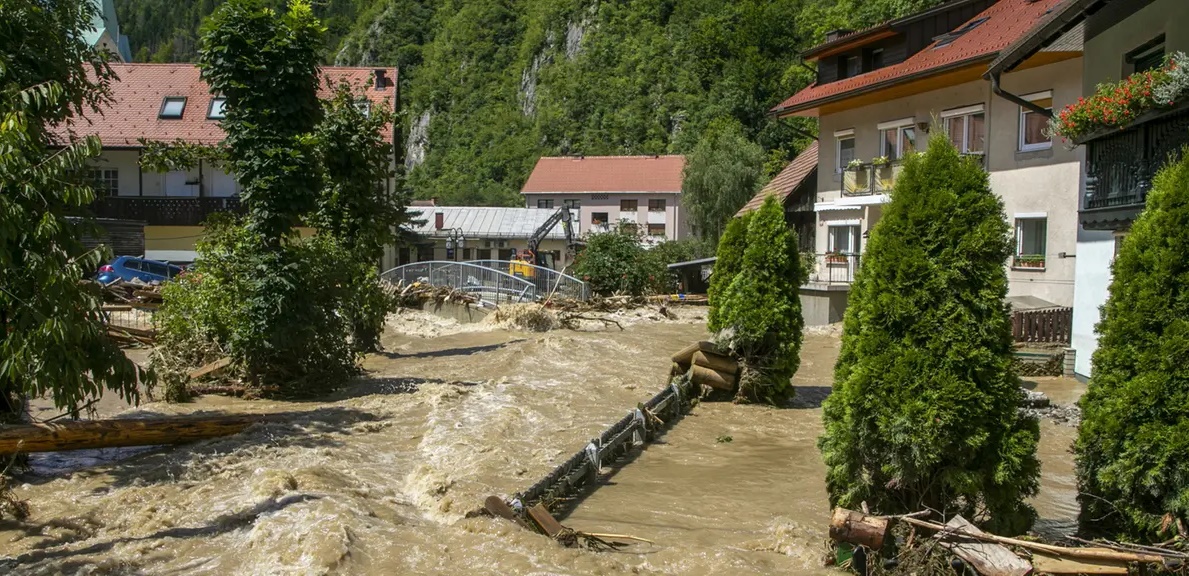Slovenia asks EU and NATO for help
After severe flooding, Slovenia is facing extensive infrastructure repairs. The country relies on international help.

There is still a threat of landslides, just like in Austria. Flood alarm also applies in other countries.
In view of the devastating floods and landslides of the past three days, Slovenia asked the EU and NATO for technical aid to repair the damage on Sunday. This was reported by the Slovenian news agency STA, citing the government.
Through the EU Civil Protection Mechanism, Slovenia requested 30 excavators of different capacities and 30 special vehicles to regulate watercourses, as well as the deployment of engineering teams for all these devices. The wish list for the EU and NATO also included 20 prefabricated bridges of up to 40 meters in length.
The country also requested from NATO five heavy military helicopters with a lifting capacity of at least five tons for transport and 200 soldiers for protection, rescue and assistance tasks.
Damages of at least 500 million euros
Slovenia is struggling with the worst natural disaster in the history of the country, which has been independent since 1991. Prime Minister Robert Golob estimated the damage on Saturday at more than 500 million euros. The road and energy infrastructure as well as hundreds of residential buildings are particularly affected.
Many villages are cut off from the outside world by the water and debris. Helpers provide thousands with the essentials by helicopter. The high soil moisture makes landslides more likely, warned the Geological Survey of Slovenia. At least six places in mountain regions were still in acute danger on Sunday.
Floods and landslides also in Austria
In the meantime, 5,000 firefighters were deployed in neighboring Austria, supported by soldiers. Above all, the federal states of Carinthia, Styria and partially Burgenland are affected by the storm.
In Carinthia, five out of ten districts were still affected by the floods. Near Zollfeld north of Klagenfurt, a person fell into the Glan and died.
The situation calmed down on Sunday, but the inflowing water and sodden, sliding slopes led to new fire brigade operations and evacuations. Dozens of houses and apartments had to be evacuated, for example in the communities of Brückl and Keutschach, because there was a risk of mudslides from sliding down soaked slopes.
The Hydrographic Service expects a significant drop in flooding at most river gauges, but not initially at the Glan and one other river. The decline there is very slow.
Water levels in Croatia are rising
Croatia, Poland, the Czech Republic and Slovakia are also affected by the storms. The rising water level of the 450 km long Mur is a particular concern – not only in Slovenia but also in Croatia. The Mur has its source in Austria, flows through Slovenia and flows into the Drau in Croatia.
In Croatia, the water levels of the rivers coming from Slovenia had risen. The village of Mursko Sredisce on the Mur directly on the border with Slovenia was considered particularly endangered on Sunday evening.
Rivers in Poland, Czech Republic and Slovakia swell
Meteorologists in the city of Olsztyn in north-eastern Poland also warned that rivers in this region could burst their banks due to the persistent rain. In the Czech Republic and Slovakia, rivers swelled due to heavy rain over the weekend. On the upper reaches of the Elbe in the Czech Republic, the lowest flood alarm level was still in effect on Sunday, but meteorologists expected the level to rise by Monday noon.

